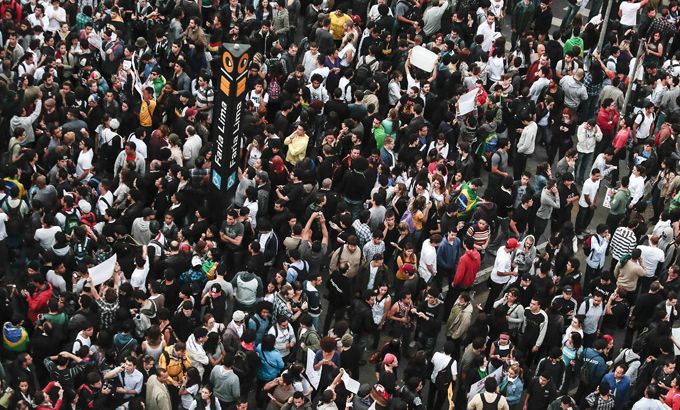Protest rallies held in Brazil’s major cities
Demonstrations against rising costs of public transport and 2014 World Cup reflect anger over government policies.

Protesters have massed across Brazil to demonstrate against the rising costs of both public transport and the 2014 World Cup to be held in the country, following clashes with police over several days.
Protesters gathered in at least seven cities on Monday in what they hoped would be their biggest demonstrations yet against the increase in transit rates.
Mostly peaceful marches in at least eight big cities on Monday drew more than 240,000 people nationwide, Brazilian media said, though demonstrations in the cities of Rio de Janeiro and Belo Horizonte were marred by vandalism and violent clashes with police.
The protest movement is mainly made up of the middle class and is critical of the government’s decision to increase transit rates by 10 cents, to $1.60.
Police in Sao Paulo estimated that 30,000 people rallied in the city’s biggest demonstration yet. Up to 20,000 people marched in Rio de Janeiro and another 6,000 took part in protests in the capital Brasilia.
In Brasilia, several thousand people under heavy police escort marched on the Esplanada dos Ministerios thoroughfare that cuts between rows of government ministry buildings.
Protests also were reported in the cities of Curitiba, Vitoria, Fortaleza, Recife, Belem and Salvador. More actions were being planned on social media sites for Tuesday in Sao Paulo and Brasilia.
Pre-match protest
In Belo Horizonte, police estimated about 20,000 people joined a peaceful crowd protesting before a Confederations Cup match between Tahiti and Nigeria as police helicopters circled overhead and mounted officers patrolled the stadium area.
The match was part of an eight-team warm-up tournament for the World Cup finals. Earlier on Monday, demonstrators erected several barricades of burning tyres on a nearby highway, disrupting traffic.
|
|
| Al Jazeera’s Adam Raney reports from Sao Paulo |
Authorities said they would respond with force only if protesters destroyed property.
In a brief statement, President Dilma Rousseff acknowledged the protests, saying: “Peaceful demonstrations are legitimate and part of democracy. It is natural for young people to demonstrate.”
Riot police had fired rubber bullets and tear gas into crowds of protesters on Thursday in Sao Paulo.
Protest organisers said more than 100 people were hurt although police only confirmed about a dozen injuries.
And on Sunday police used tear gas and rubber bullets again when several hundred protesters marched near Maracana stadium before the match between Italy and Mexico.
Brazilian officials have been using drones, thermal cameras and thousands of troops to patrol the six stadiums hosting matches in six different cities across the country.
Widespread corruption
Brazilians have long accepted malfeasance as a cost of doing business, whether in business or receiving public services.
The government loses more than $47bn each year to undeclared tax revenue, vanished public money and other widespread corruption, according to the Federation of Industries of Sao Paulo business group.
But in the last decade, about 40 million Brazilians have moved into the middle class and they have begun to demand more from government.
Many are angry that billions of dollars in public funds are being spent to host the 2014 World Cup and 2016 Olympics while few improvements are made elsewhere.
The government of Brazil, where almost one-fifth of the population lives in poverty, estimates that hosting the 2014 World Cup will cost $14.5bn. Some tickets are expected to cost more than the country’s minimum wage of $300.
The government has asked FIFA to make 500,000 seats available for free to the poor.